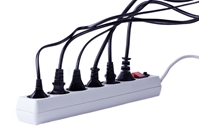Electricity has been around for over a century, and it has played a significant role in our daily lives. If it wasn't for the work of utility companies, Americans wouldn't be able to complete an array of tasks like pump gas, visit an ATM or watch television.
However, since the concept of electricity was discovered, communities and businesses are at the mercy of the power grid — one that can fail at any given moment, according to the News Tribune.
This may sound like a surprise, but it's true. Utility companies are at the mercy of inclement weather, while a lack of cyber security puts them in a compromising position against hackers and cyber terrorists, the News Tribune explained.
Adam Crain, owner of a technology firm in North Carolina, found that it only takes a planned attack from nine substations to knock out electricity across the continental United States. Even though there are over 55,000 substations, if hackers choose wisely, they'll be able to shut it all down. Crain discovered such after hacking into his local utility company's server.
If that doesn't sound like a concern, consider this: utility providers lose $18 to $33 billion per year due to power outages, according to the Wall Street Journal. Massoud Amin, an electrical and computer engineering professor at the University of Minnesota, found that current framework of many electricity companies will continue to fail if they don't take active steps to change it.
"The [power] grid must become stronger, more secure and more resilient," Amin told the news source.
The challenge in this situation is that many utility poles are located near trees, which could potentially knock out electricity during a storm. Some might think that a solution to this problem would be to put electricity systems underground, but Hurricane Katrina was an example of why that that doesn't apply to all states.
At this time, a large number of backup generators in the New Orleans area were destroyed by the severe weather system, which further delayed the city's chances of getting operations up and running sooner. In fact, the cost of paying to put substations underground cost seven to 12 times more, AccuWeather reported.
"There is no cookie-cutter solution for the nation; you have one or two solutions everywhere," Amin added. "The solutions have to depend on the location and what risk we are mitigating."
This multifaceted concern shows that utility providers need to do more to secure the premises. However, when Adam Crain brought up this concern to utility providers, they explained that measures have either been taken or that it is not a priority at this time.
When severe weather is more of the norm during the spring and summer seasons, so taking action before a weather event occurs can make a significant difference to businesses, cities and towns.
Because a solution varies from one state to another, it is pertinent that utility providers work with business continuity consultants to identify a strategy that is cost-effective and helpful to its customers.

